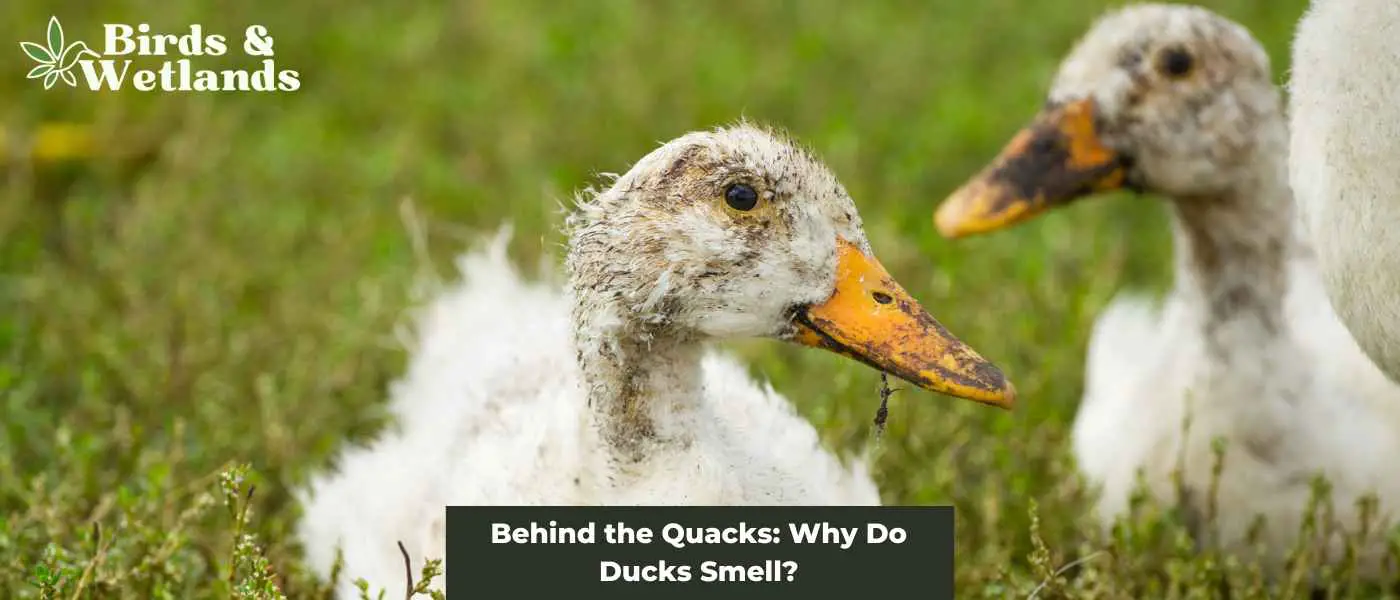If you have pet ducks, or are considering letting your ducks indoors, you may be wondering, do ducks smell bad?
Ducks may emit an unpleasant smell due to a number of reasons. The most common is their natural musk, which is a scent produced by oils in their skin and feathers that help keep them waterproof. Another reason can be their diet, as certain foods can influence the smell of their droppings. If ducks are not kept in clean conditions, the smell of their waste can build up, leading to a strong, unpleasant odor.
Key takeaways on Do Ducks Smell Bad?
Ducks are versatile farm animals, providing meat and eggs, but they are known to be smelly due to their lack of hygiene.
The smell is often more about their living conditions than the ducks themselves, particularly if their environment is not cleaned frequently and lacks proper ventilation.
Overcrowded coops can contribute to the smell, as ducks can spread feces around the pen.
Ducks may develop the habit of eating their own feces. Offering them snack alternatives like fruits and vegetables (excluding nuts and large seeds) can help deter this behavior.
Why Do Ducks Smell?
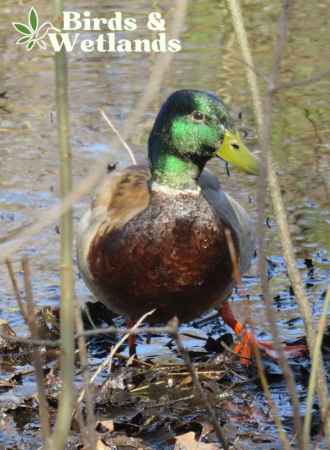
One of the primary reasons why ducks smell is due to their weak sense of smell. While they can detect certain scents, their olfactory system is not as keen as that of dogs or other birds. This means that they are less likely to notice and avoid foul-smelling areas, which can lead to them spending time in areas that emit unpleasant odors.
Another factor that contributes to the smell of ducks what ducks eat. Ducks are omnivores and will eat a variety of foods, including insects, plants, and small animals. However, not unlike chickens, their diet can sometimes include items that emit strong odors, such as fish or certain types of plants. When ducks consume these foods, their bodies can emit a distinct odor that can be unpleasant to some people.
The living conditions of ducks can also contribute to their smell. Ducks that are kept in dirty or overcrowded conditions are more likely to emit a strong odor, as their waste can build up and create a foul smell. To prevent this, it is important to keep their living area clean and well-ventilated, and to provide them with plenty of space to move around.
Duck Pen and Coop
One of the main contributors to smelly ducks is their living space. Ducks are messy eaters and produce a lot of waste, so it’s important to keep their pen or coop clean if you don’t want them smelling bad.
Regularly cleaning out their droppings and dirty water will help prevent any trapped water from producing a foul odor. Using proper bedding materials for your pet duck, such as straw or wood shavings which ducks love, can also help absorb moisture and reduce odor.
Proper Ventilation
Proper ventilation is crucial to keeping the air fresh and odor-free in a duck’s living space. A well-ventilated coop or pen will allow for fresh air to circulate and prevent the buildup of any unpleasant odors. It’s important to make sure that the ventilation system is not too drafty, as this can cause respiratory problems for the ducks.
Adequate Space
Providing adequate space for your ducks is also important for preventing any foul odors. Overcrowding can lead to stress and unsanitary living conditions, which can contribute to a terrible odor. Ducks need enough space to move around, stretch their wings, and access food and water without overcrowding.
Ducks and Their Smell: How to Get Rid of It
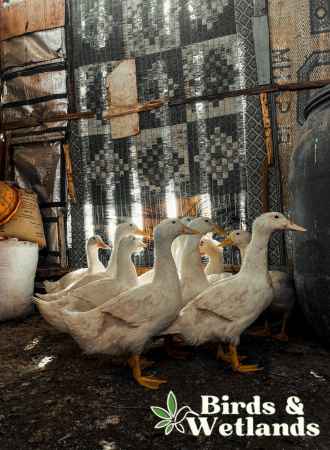
There are several ways to reduce the smell of ducks:
Regularly clean the duck pen, ideally once or twice a week. Use materials like hay, straw, or rice hulls for bedding, and ensure good ventilation.
Watch out for stagnant water in the coop, which can contribute to the smell.
Lime mixed with sawdust can be spread around the coop to help mask the smell.
Monitor the ducks’ diet. Ducks eating a diet high in protein produce smellier feces. Alternating their diet between protein and regular feed can help.
Bathing ducks or allowing them to swim in a clean pond or pool can help them clean off and reduce the smell.
Avoid keeping ducks indoors. If this is unavoidable, ensure their indoor area or the ducks coop is cleaned frequently.
Spread Lime
One effective method is to spread lime in the duck coop. Lime not only reduces acidity but also destroys pathogens, reduces bacteria, and controls diseases. Spread a generous amount of lime over the surface of the coop and rake it in. Leave the mulch in there to break down for months, as long as you turn over the poopy areas daily.
Regular Feed
Watching your duck’s diet closely can also help control their smell. Generally, food with higher protein content may be good for ducks when they are laying eggs. A regular feed schedule can also help reduce the smell of their poop. Whether you are keeping ducks for duck meat or for them to lay eggs, its vital to get feeding ducks correctly, not just to get rid of any putrid odor, but also for health reasons.
Clean Water
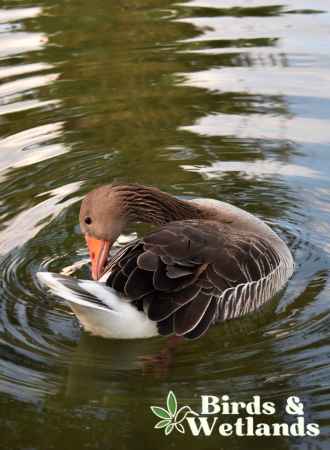
Ducks need clean water to swim and drink. If the water is dirty, it can spread odor and get on their bodies when they trek over it. Replace the water and rake out the pen twice a day to keep the coop smelling its best.
Trapping Insects
Insects can also contribute to the smell of the duck coop. Trapping insects can help reduce the odor. Using a bug zapper or sticky traps can be effective.
Can Ducks Smell?
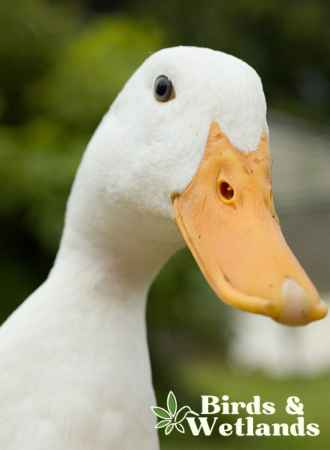
Ducks do have a sense of smell, although it is not as developed as in some other animals. They have a small olfactory bulb in their brain, which is responsible for detecting and processing smells. While ducks may not rely on their sense of smell as much as some other animals, it still plays a role in their daily lives, particularly when it comes to finding food and identifying predators.
Ducks use their sense of smell for a variety of purposes. They can smell food in the water, which helps them locate their prey. They can also smell predators, which helps them avoid danger. Ducks use their sense of smell to find their mates during breeding season.
Ducks also rely on their sense of sight and hearing to navigate their environment. Their eyes are well adapted to detect colors and movements, while their ears can pick up sounds from far away.
Mating and Reproduction
For many species of ducks, the ability to find a suitable mate is essential for reproduction. Male ducks will often use their sense of smell to locate females who are ready to mate.
This is particularly important for species that breed in large groups, such as mallards, where males need to be able to distinguish between receptive and non-receptive females.The scent of a female duck can also help to deter other males from attempting to mate with her.
Foraging and Food
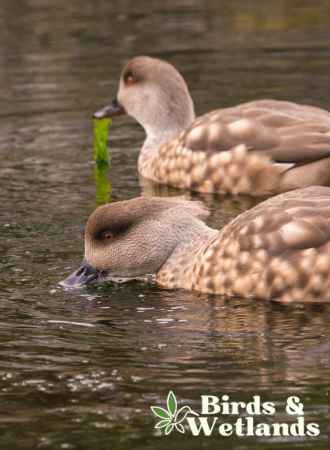
Ducks are omnivores, and they rely on a variety of food sources to survive. Their sense of smell can help them to locate food both on land and in water. For example, ducks can detect the scent of vegetation that is rich in nutrients, such as algae or submerged plants. They can also smell prey, such as insects or small fish, that they can hunt and eat.
Survival and Danger
Finally, a duck’s sense of smell can also help it to avoid danger and survive in its environment. Ducks can detect the scent of predators, such as foxes or raccoons, and take evasive action to avoid being caught. They can also use their sense of smell to locate water sources, which are essential for their survival.
FAQs on Do Ducks Stink
What smell repels ducks?
Certain smells can deter ducks, including strong, pungent odors like vinegar, garlic, and chili peppers. These scents can be unpleasant to ducks and deter them from visiting certain areas. However, it’s important to note that using these substances should be done responsibly, as some can potentially harm the ducks or the environment if used in excess.
How do you keep ducks from smelling?
Ducks don’t make great indoor pets because of their smell and also because they cannot be potty trained and they have some of the smellier poop. To prevent ducks from smelling, regular cleaning of their living quarters is necessary. This involves removing and replacing their bedding, cleaning their water and food dishes, and ensuring the area is dry to prevent mold and bacteria growth. A diet that’s balanced and appropriate for ducks can also help reduce odors.
What does duck smell like?
A live duck generally does not have a strong smell unless it is unclean or its environment is not properly maintained. However, when cooking duck, it has a rich, meaty aroma that’s unique but somewhat similar to other poultry. Its fat, when rendered, also gives off a distinctive scent that’s often described as nutty and savory.
How messy are ducks as pets?
Ducks can be quite messy household pets. They eat, drink, and defecate a lot, which can result in a significant amount of mess in their living area. They love water and will splash and play in it whenever possible, which can add to the overall mess. Regular cleaning and maintenance of their living space is necessary.
Is it safe to bathe a duck?
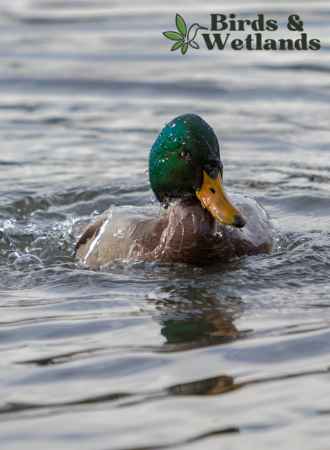
Yes, it is safe to bathe a duck, but it’s typically unnecessary as ducks are excellent self-groomers. They have an oil gland near their tails which they use to keep their feathers waterproof and clean. However, if a duck does need a bath due to a mess it can’t clean itself, lukewarm water without soap is best. Always supervise bath time to ensure safety.
Why does my duck smell bad?
A duck might smell bad due to several reasons. It could be due to an unclean living environment, inadequate diet, or health issues. Ducks defecate often and if their housing isn’t regularly cleaned, a bad smell can develop. Similarly, a diet high in proteins can cause smellier feces. If hygiene and diet aren’t the issue, it’s possible the duck could have a health problem, warranting a visit to the vet.
How do you get rid of duck smell?
To get rid of a duck smell, regularly clean the duck’s living area, replace bedding frequently, and ensure their diet is balanced. If the smell is coming from a cooked duck, proper ventilation, such as using a kitchen exhaust fan, can help. Odor-neutralizing sprays or air fresheners can also be used to combat lingering smells, but they should be used sparingly to avoid harmful effects on the ducks.

